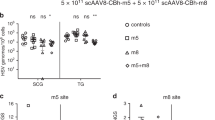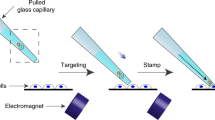Abstract
Herpes simplex virus type 1 (HSV-1) has many attractive features that suggest its utility for gene transfer to neurons. However, viral cytotoxicity and transient transgene expression limit practical applications even in the absence of viral replication. Mutant viruses deleted for the immediate–early (IE) gene, ICP4, an essential transcriptional transactivator, are toxic to many cell types in culture in which only the remaining IE genes are expressed. In order to test directly the toxicity of other IE gene products in neurons and develop a mutant background capable of long-term transgene expression, we generated mutants deleted for multiple IE genes in various combinations and tested their relative cytotoxicity in 9L rat gliosarcoma cells, Vero monkey kidney cells, and primary rat cortical and dorsal root neurons in culture. Viral mutants deleted simultaneously for the IE genes encoding ICP4, ICP22 and ICP27 showed substantially reduced cytotoxicity compared with viruses deleted for ICP4 alone or ICP4 in combination with either ICP22, ICP27 or ICP47. Infection of neurons in culture with these triple IE deletion mutants substantially enhanced cell survival and permitted transgene expression for over 21 days. Such mutants may prove useful for efficient gene transfer and extended transgene expression in neurons in vitro and in vivo.
This is a preview of subscription content, access via your institution
Access options
Subscribe to this journal
Receive 12 print issues and online access
$259.00 per year
only $21.58 per issue
Buy this article
- Purchase on Springer Link
- Instant access to full article PDF
Prices may be subject to local taxes which are calculated during checkout
Similar content being viewed by others
Author information
Authors and Affiliations
Rights and permissions
About this article
Cite this article
Krisky, D., Wolfe, D., Goins, W. et al. Deletion of multiple immediate–early genes from herpes simplex virus reduces cytotoxicity and permits long-term gene expression in neurons. Gene Ther 5, 1593–1603 (1998). https://doi.org/10.1038/sj.gt.3300766
Received:
Accepted:
Published:
Issue Date:
DOI: https://doi.org/10.1038/sj.gt.3300766
Keywords
This article is cited by
-
Synergistic effects of deleting multiple nonessential elements in nonreplicative HSV-1 BAC genomic vectors play a critical role in their viability
Gene Therapy (2017)
-
Engineered HSV vector achieves safe long-term transgene expression in the central nervous system
Scientific Reports (2017)
-
An HSV-based library screen identifies PP1α as a negative TRPV1 regulator with analgesic activity in models of pain
Molecular Therapy - Methods & Clinical Development (2016)
-
Oncolytic HSV virotherapy in murine sarcomas differentially triggers an antitumor T-cell response in the absence of virus permissivity
Molecular Therapy - Oncolytics (2014)



